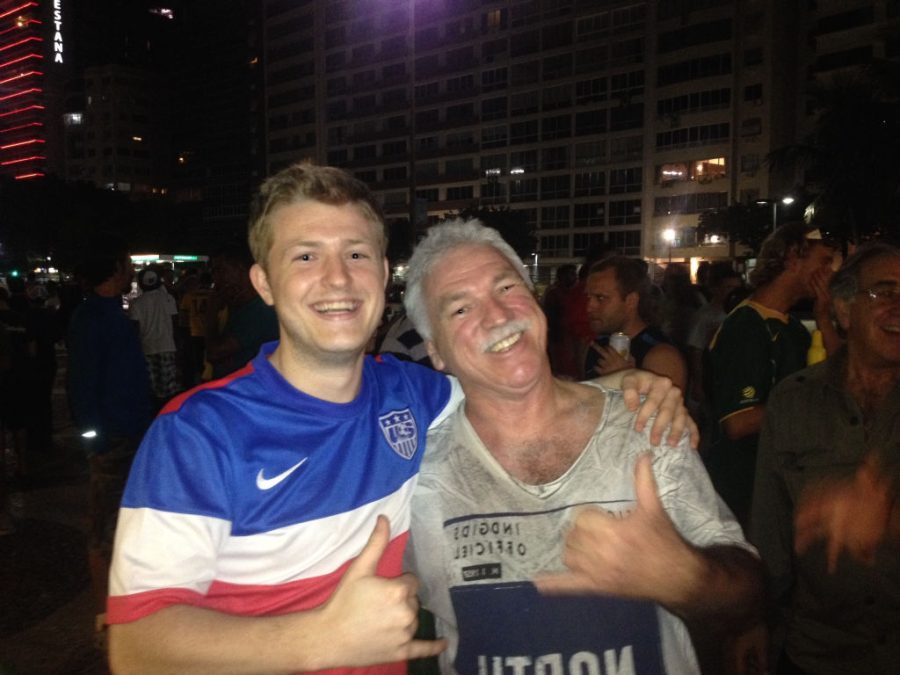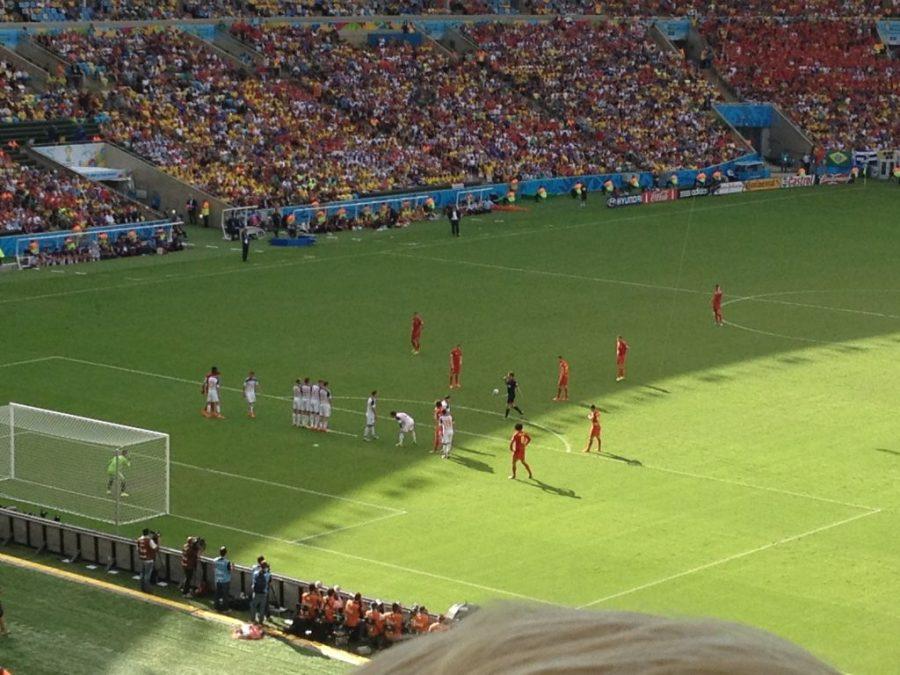At 30,000 feet in the air it suddenly struck me. I had never been to an international football match outside of America before, let alone a World Cup. Brazil was only four hours away and I was uneasy, shaking as much as our plane traveling through turbulence. I was anxious for mainly one reason. I felt like a pariah; all of my friends had bailed and I was flying there with my brother’s friends, a bunch of Ivy and NESCAC elitist graduates. The only reason I was even there was because my brother, Brendan, paid for half of my trip. I’ve always seemed to be a misfit and this group didn’t seem to be my mold. Being an outsider has always hurt, I have never felt like I belong.
I viewed most of Brendan’s friends as arrogant and conceited, to be quite honest. I thought they looked down on me. The only person I felt I could relate to was my brother. He was different. Where I’m from if you call football “soccer,” well, then you’re what we call a “typical American idiot.” The funny thing was, everyone I was with called it soccer. Growing up, football had been my life. I dedicated all my time to football. I played for the New England Revolution’s feeder squad. I was even recruited to play Division I soccer at Fairfield University, but once I got to college my self-doubt seemed to override all of my abilities. I was always nervous about what people thought of me. This was my biggest flaw.
Once we arrived in Brazil, everything changed. In the distance I could see beautiful mountains thrusting out into the infinite azure skyline. The Christ the Redeemer statue stood beyond the mountains, above the peaks, silently gazing upon his city, and protecting his Brazilians. The air was thick and muggy but smelled of salt and sand from the beaches. Suddenly all of my fears and worries were temporarily at bay. I began to forget about the isolation I experienced within our group.
For the entire trip all that the elitist group wanted to do was to hit the expensive restaurants, laze on the beach, go to rooftop bars, and get drunk throughout the night. On the other hand, my idea of fun was to immerse myself within the culture. I wanted to hit the streets, find some football, frequent the hole-in-the-wall restaurants, and order misto quente and try Brazil’s famous açaí. I tried to explore what Brazil had to offer. Everyone seemed to look at me as a misfit because I kept challenging what the group wanted to do. My entire life I have felt like an outsider. See, I was born in the U.S. but both of my parents are from a small town — Chesterfield, England. All of my life I was labeled as the English kid, however, I embraced it at the time. Being different was great, but, as I aged, I started to think that it made me an outcast.
After the first couple days, I hadn’t done anything I wanted to. I decided to split from the group. I started to see the sights. I climbed Sugarloaf Mountain, I biked through the winding alleyways and streets, I climbed jagged sea cliffs to gaze out into the shades of aqua in that sea. Eventually I made it to Forte de Copacabana. The military base was originally constructed in 1908 and rebuilt several times until it was decommissioned in 1987. Today it stands as a public museum for anyone to visit. I was intrigued by how much the fort had changed over time. I realized there that I too needed to reconstruct parts of myself in order to carry on and be happy. Mainly, I needed to learn to accept myself.
The next night I went out on my own for the last time. I hit the local bars to get a sense of what natives do for fun. I met a big group of Brazilians. We talked about Thiago Silva, David Luis, Oscar, Paulinho, Willian, and even players on other squads. I couldn’t speak Portuguese, I was white, and didn’t know the street signs, the local fashion, or the music.
What I did know was football and they loved me for it. I bought them beers and they returned the favor. We’d laugh when I spoke broken Portuguese, or when they spoke broken English. We were able to communicate without words and still understand each other perfectly. What we knew was that we all loved the beautiful game and that’s all that mattered.
That night we went out to see the Brazil game at the FIFA Fan Fest. After every Brazil goal, we would furiously chant “Vai Brazilia,” pumping our fists in the air and jumping like the ground was crumbling beneath us. When we hit the sand the earth would shake. The roar from twenty thousand Brazilians sent a rhythm through the ground. I could feel the cool moist sand sifting through my toes, as I was trying to jump with the crowd and celebrate with the nation. All of Brazil was alive. I loved the sport as much as everyone in that stadium. We would die for it. I have never experienced such an immense passion that carried an entire nation on its back. People from every country were equally accepted as long as they shared the love.
We were all one, intently focused on the game on the big screen in front of us. Was this unification something I had always been missing? Or did I always have it through my passions? Did it just get overlooked?
It’s interesting that traveling four thousand miles helped me feel like I belong. Sometimes a change of scenery can guide us towards a self-transformation. I realize now that what makes us different doesn’t make us outsiders. We become outsiders by thinking negatively about ourselves. We all aren’t born as superheroes or professional athletes. But we do all have our own talents and uniqueness that no one else in the universe can replicate. Those subtle differences make us who we are. Our differences make us beautiful — they’re what makes us interesting.
We don’t love people for what makes them ordinary and normal, but for what makes them stand out. Standing out is a great thing and it doesn’t mean we’re alone. Fitting in with the culture helped me realize this, because while technically I was an outsider, a foreigner, once I returned back home and to the group, I realized that I am not an outcast. I am who I am.
Bonding over football: Finding yourself in Brazil
By Dylan Hawkins
|
October 17, 2014
A match in a packed stadium during the World Cup


